
Anuradha Sharma
Anuradha Sharma is an independent journalist based in Siliguri in Darjeeling district. She writes on politics, culture, media, social justice, and environment, among other issues concerning India and its neighbours. She won the Laadli Media and Advertising Award for Gender Sensitivity 2020 for her longform piece on the plight of women in closed tea gardens of north Bengal.
The year is coming to an end, presenting an occasion to reflect on something extraordinary that happened in it.
Like last year, I found myself in the core team of organisers of the Foothill Notes 3, the annual literary meet of Siliguri which has made quite a name for itself by now. Well, calling it the “core team” makes it sound like there were other, peripheral, teams too. But that was not the case. We were just one skeletal bunch of seven odd people—disparate, like cheese and chalk, but united by the love for books and writing. You can make that eight, to also include the husband of the coordinator who steadfastly refused to be seen as part of us, but did the most work in the background; he’s allergic to limelight.
Anyway, never mind the size, we did manage to accomplish a huge feat in the form of Foothill Notes 3 held at Salbari’s Café the Twins over two days from December 7. Important thing to note here that the feat was huge, not the event. True to its character, Foothill Notes 3 was a small, intimate, frills-free exercise that saw the coming together of some of the most powerful thoughts and ideas in very humble settings.
Highlights
For me, it was a great delight to be part of the launch of the second volume of Colours of Kanchenjunga by Sharda Chhetri published by Bee Books. I have known Shardadi ever since my early days in journalism. She has been a pioneering woman journalist for this region. An educator for a long time, she has made her literary foray with the translations of Nepali short stories. Her second volume comes after a huge success of the first volume, both published by Bee Books.
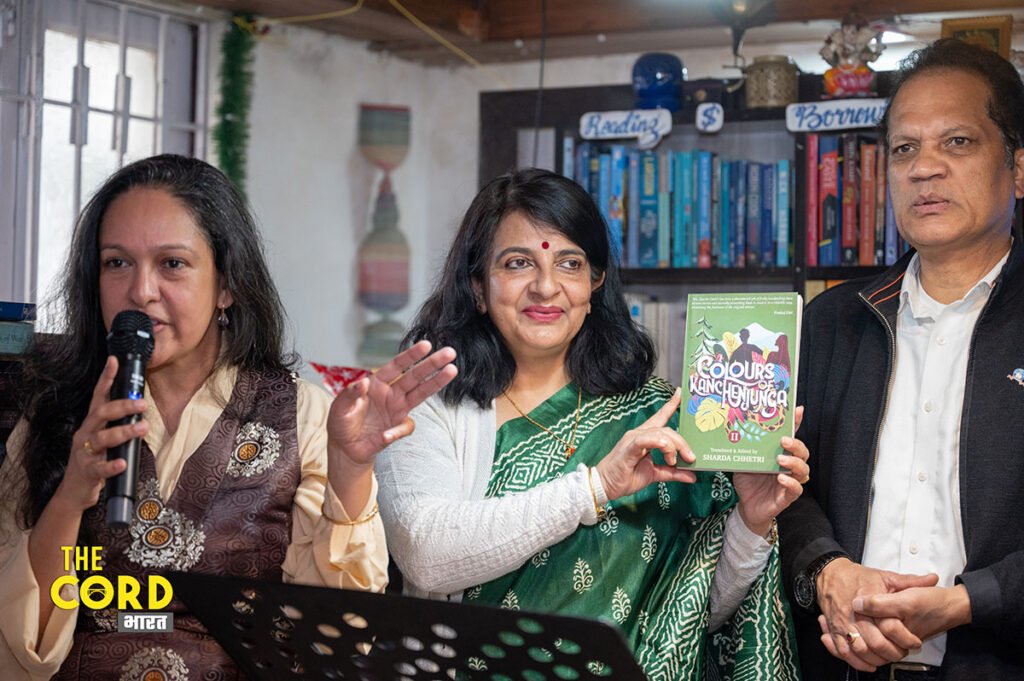
If hers was a book launch, For Nagaland’s Sahitya Akademi Award-winning author, Easterine Kire, it was the “unveiling” of her latest book. She was one of the guests of honour at the meet and her session was scheduled for the next day. As we got to know upon her arrival that she had not even seen her latest book Freerain published by Penguin. Copies of her book were procured by Café the Twins, and we decided to have a small ceremony. It gives us joy to say that it was at Foothills, that Kire saw the physical copy of the book for the first time. Jokingly, she told the gathering that it felt like someone who had given birth to, but hadn’t been able to see the baby.
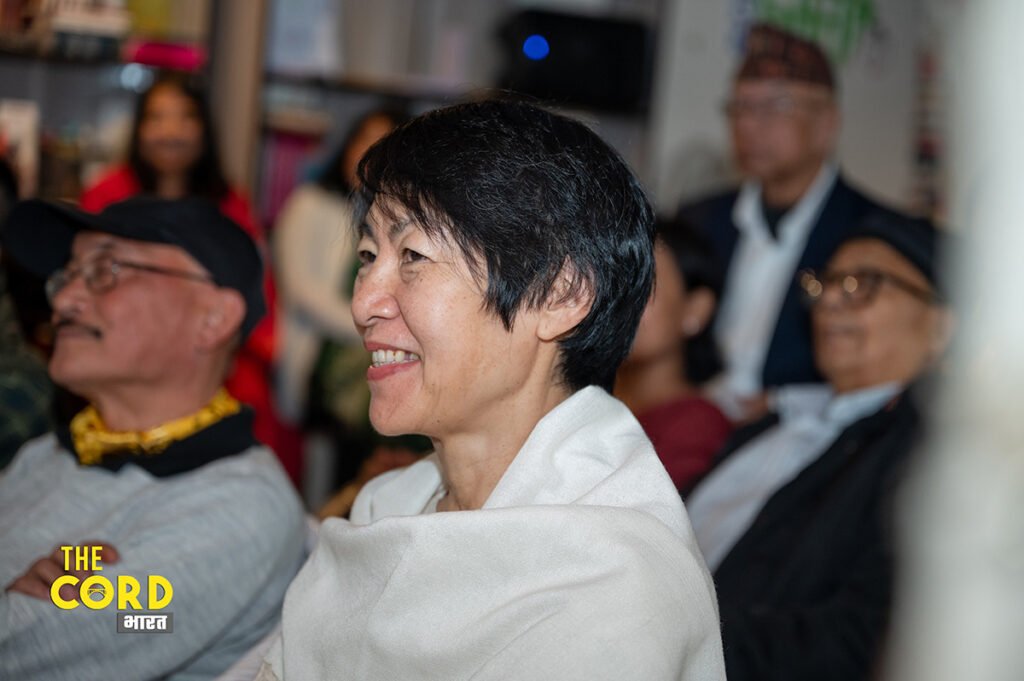
The focus of the post-lunch sessions, however, was children’s literature. In a panel moderated by Preeti Thapa, authors Anurima Chanda and Kabita Lama spoke at length on the topic, “Decolonising Literature Through Regional Narratives.” This was followed by a children’s play adapted from Shantiban, a novella based on Nepali bird folktales written by the noted author Sangmu Lepcha. The play was directed by Sujata Guha who discovered Shantiban soon after moving to Salbari from Kolkata last year and decided to turn it into a play. No, she is not into theatre or anything. By training she is a scientist who studied microbiology in the US before moving to India, where she studied Ayurveda. It is her love for children and interest in Nepali language and culture that brought her close to Lekha Rai, the proprietor of Café the Twins (I am the “mutual friend”). Rai has been successfully running Kathaghar, an initiative of monthly story-telling camps for kids. Guha adapted the play from Denuka Rai’s English translation. Her play was then translated back into Nepali by Smriti Pradhan, the co-founder of Chhimeki, an NGO working on social health. And Chhimeki are co-organisers of Foothills.
Day two saw poetry take centre stage in the first half, the section helmed superbly by the young and enterprising poet Loden Lama. Robin Singh Ngangom, the noted poet and translator from Manipur, held an exclusive workshop for a handful of aspiring poets, an experience they won’t forget in a hurry. This was followed by a session on Haiku by Ibohal Kshetrimayum, also a poet from Manipur, who shared with us his unsurpassable love for Basho.
Open mic generated a lot of excitement with local poets and authors baring their souls through their poems and songs. A surprise entry by the education entrepreneur Robi Subba sent ripples through the rather festive air. He had the audience transfixed with the renditions from his upcoming book of poems.
In my session that took place in the evening, I had authors Preeti Brahmin and Suraj Gurung and the award-winning filmmaker Vivek Rai sharing their interesting journeys in the session, “Storytelling in the hills: Exploring Local Narratives and Identities.” Three speakers from absolutely diverse backgrounds in one panel made it a melange that defines Foothills in some ways.
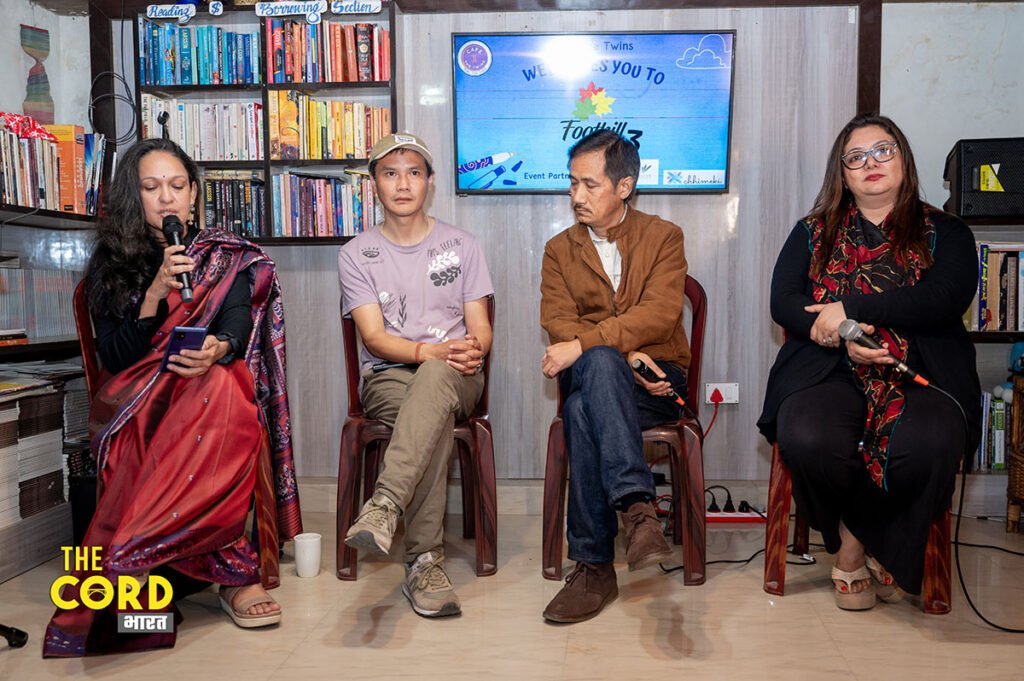
“Of Skies Rivers and Earth: Easterine Kire in conversation with Priyanka Chatterjee” was the last and the centrepiece of this edition of Foothill Notes. Kire is the noted Indian poet and author from Nagaland, who recently won the Sahitya Akademi Award for her novel Spirit Nights.
The team
At the centre of it is Lekha Rai, the proprietor of Café the Twins. Oh boy, does she wear many hats! A former educator, she is not only a successful entrepreneur, but has also made a name for herself as a storyteller for children, having professionally trained herself at Kathalaya International Academy of Storytelling, Bangalore. She started her book café five years ago, named after her twins, of course, in the trendy suburbs of Salbari. Since its inception, the space has served as a meeting point for ideas and people. The café has hosted numerous events such as book launches, writers’ conversations, open mics, and writing workshops for children. Its annual Literary Queens programme felicitates women writers from the world of Indian Nepali literature.
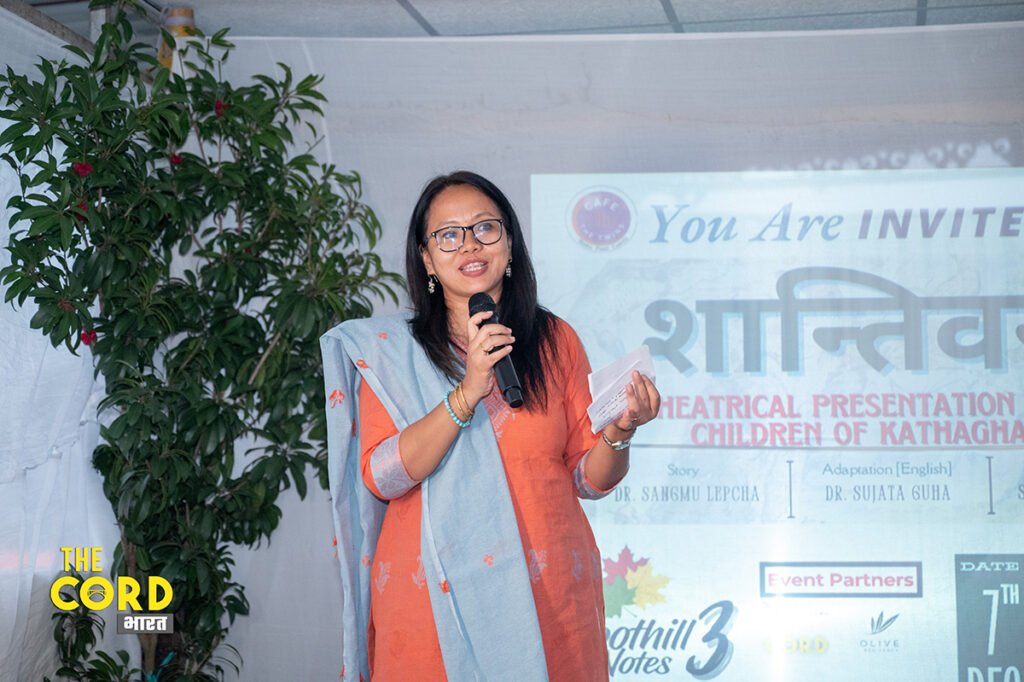
Foothills happened under the mentorship of Pankaj Thapa, who was earlier the force behind Gangtok’s literary meet, Converse. A retired academician and graphic artist, his connection with the literary world has been through the innumerable books by noted authors, especially from the Northeast, that he has illustrated.
Thapa was joined by Satyadeep Chhetri, his colleague at a government college in Gangtok. Chhetri, again, wears innumerable metaphorical hats even though he is always seen in his trademark beret. Chhetri is the author of the quite popular Gorkhaland Diaries and Sikkim: from Autocracy to Half-Democracy.
The three of them began Foothill Notes in 2022, when the world was coming back to normal after the pandemic. In 2023, I discovered Café the Twins—a friend of mine had taken me there to attend an event organised by the Chhimeki. It is an NGO with a vision to promote social health among societies where individuals, families and communities live in interdependence and thrive in relationship with each other and nature. In no time, without even realising, I was friends with Lekha and the Chhimeki founders, the husband-wife duo—Abhay and Smriti Pradhan. Joining forces for Foothill Notes seemed like the most logical thing to do.
This year, the group got bigger and more enriched by the presence of Rahul Sinha, the creative head at Dreamlens, a company that has made a name for itself in the field of wedding photography. A teacher-turned-photographer, Sinha is known for his stellar work with the camera and has been chosen by the camera giant Nikon as its brand influencer. His news-based Hindi social media platform called The Cord (Bharat), with a subscriber base of over 60,000, joined in as a media partner.
Speaking of me, I am a journalist and a mother and my main job is to balance the two roles.
How we did it
A great team and lots of love made it happen. Of course, that’s only a partial truth. The fest would not have seen the light of day if it weren’t for the generosity of well-wishers—both individuals and institutions—who put their faith in us. Before I share more about their contributions, let me highlight the remarkable support we received from our authors themselves. Many of our speakers travelled from the remote Northeast at their own expense, just as they had in the previous two editions. Their unwavering commitment is what fuels our passion.
A young poet from the region, who had participated last year but could not make it this year, bought the air tickets to fly in another speaker.
A major shot in the arm came with Allan Biswas of Champasari’s Olive Residency deciding to provide free accommodation to the guests during their stay here. His luxurious yet cosy service apartment was indeed the proverbial home-away-from-home to our guests.
Thanks to Sharda Chhetri again—she is awe-inspiring not without a reason—we were able to get financial assistance from a private donor Ashish Chhetri from Australia and the Kolkata-based Art Connect Foundation, an NGO that uses art as a medium to connect the society, for the staging of the play Shantiban.
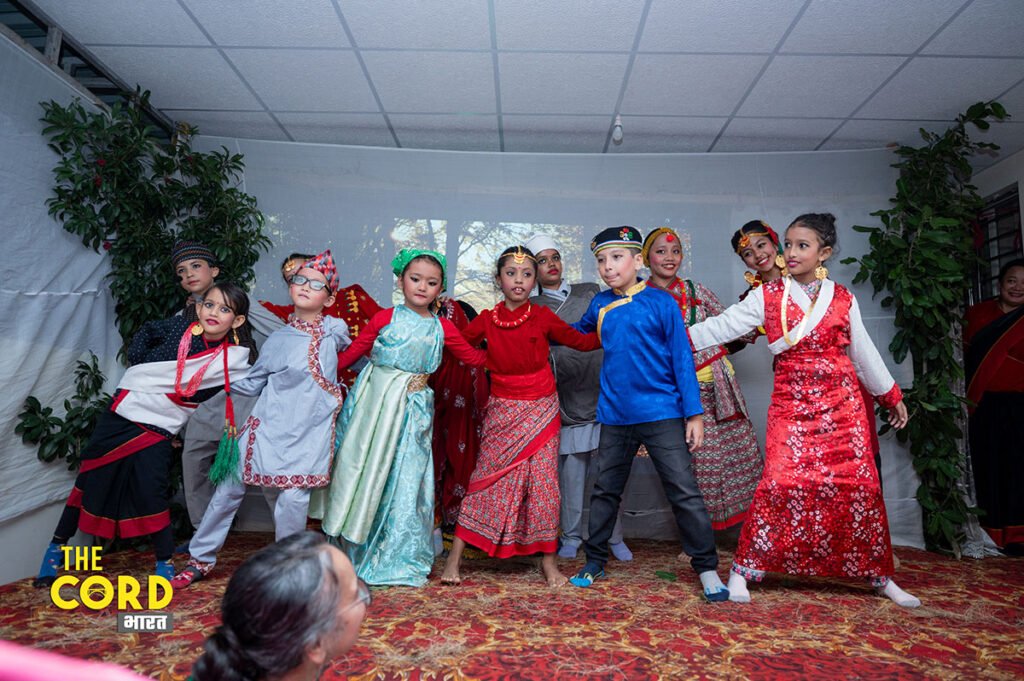
Organising members also dug into their own resources, supported by their family and friends. Rahul Sinha not only provided media partnership via The Cord and additionally financed the sound arrangement for both days. Lekha’s father-in-law sponsored the dinner on the first day. The last big push came from Sujata Guha with her generous contribution, covering the second dinner and other expenses, practically ensuring we are not in the red.
We must say we did not run after money so much. We admit we are really awful at it, but we also were treading cautiously accepting money from those who genuinely like what we do. We are rather dogged about protecting our independence and were clear about not accepting money that would compromise our autonomy.
We really value the small contributions, which were not always in the form of money. Veganation, Salbari’s own vegan restaurant, packing dinner for our speakers on the day of their arrival was an act of kindness that we shall remember forever. Chhimeki’s Pradhan couple arranging steaming hot momos at the end of the tiring two days was soul-saving! Satyadeep Chhetri and Rahul Sinha thoughtfully took our guests on a short trip to the hills which they enjoyed a lot.
Support came from many quarters and many ways. Sample this! Lekha and I had gone to Himal World office to invite them to the event. They immediately arranged for a live interview of us, giving us a platform to speak about Foothill Notes and the ideas behind it. Not only that, they also broadcast the Shantiban play live to all their audiences. Now, isn’t that cool?
Why we do it?
We must be crazy, or gluttons for punishment; our friends might be right about us. But they don’t know the joy it brings us to make something like this happen in our small corner of the world.
We organize Foothills because we envision a liberating space where ideas reign supreme, and creative minds showcase the beauty of the universe. We want to offer a platform to our writers, readers and literary enthusiasts to connect and share their passion for literature. Our goal is to cultivate a unique literary culture that is inclusive, progressive, and reflective of the diverse heritage of our region lying along the Eastern Himalayas.
We want to do this for the writers. We need them, more and more of them; now more than ever before. Because, to quote Ursula Le Guin:
“I think hard times are coming, when we will be wanting the voices of writers who can see alternatives to how we live now, and can see through our fear-stricken society and its obsessive technologies, to other ways of being. And even imagine some real grounds for hope. We will need writers who can remember freedom: poets, visionaries—the realists of a larger reality.”


